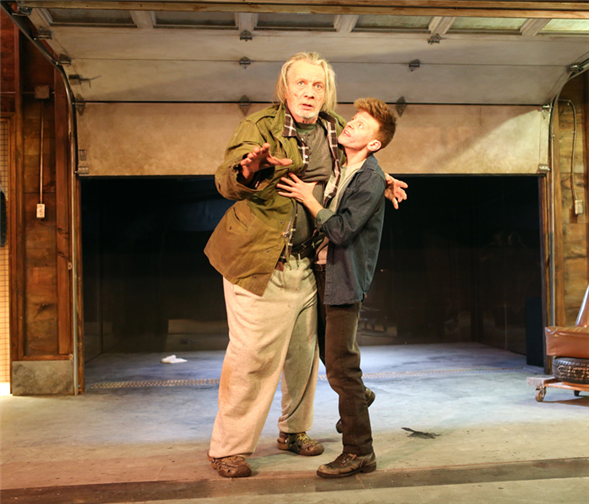Translate Page

A surreal play brings a father and son closer
---
According to director Dustin Wills, it was crucial to cast a trans actor in Basil Kreimendahl's play Orange Julius, which is now at the Rattlestick Playwrights Theater.
"I don't think it would have been done if we didn't have a trans performer for that role," says Wills. "We were fortunate to have a performer who was perfectly suited to that role."
That performer is Jess Barbagallo, who played George in Wills' 2016 production of O, Earth, a "trans fantasia" inspired by Our Town. "That's when I got steeped in the [trans] community in New York deeply," the director says. "Jess brings a lot of experience to the role – as does Stephen Payne, who is a Vietnam War veteran."
In the play, which Rattlestick is co-producing with Page 73, Julius, the father, is a Vietnam vet dying from the cancerous effects of the chemical weapon Agent Orange. Nut, his adult child, tries to reconnect with him by caring for his decaying mind and body, confronting childhood memories, and envisioning war movie fantasies. Through this, the two bond in unexpected ways.
{Image1}
As Wills says, "Nut really is trying to be seen as a man by his father, and in pursuit of doing that, Nut has to imagine the circumstance of the father, living deeply what the father went through in the war and how it affected his life after that."
In the play, Nut imagines himself in Vietnam with both his father and a character called Old Boy. Wills says Old Boy "is this hyper-masculine figure of Nut's creation who represents a view of masculinity that Nut imagines: strong and aggressive, but coming from a place of caring for your comrades in war.
"But the father looks at that masculinity in a completely different way: from the point of view of bravery and courage. So you've got these two ideas of what masculinity is, and through the imagining of the Vietnam scenarios they come to find equal ground on how they understand what a man should be."
As it explores all this, Kreimendahl's play jumps frequently through time and a variety of locations. "It's a 66-page play with about 68 scenes in it," says Wills. As the director, it's his responsibility to shape these fleeting moments into a coherent whole. "Originally we were trying to create a space for all the different locations of the play, and it was a nightmare task," he recalls.
Eventually, Wills and set designer Kate Noll decided to place everything in a garage, which for many men is a macho shrine. "A garage is this private space where we think fathers are, working on cars and model airplanes, a space that's neither inside nor outside," Wills says. "A garage is also this place where you store old memories and other things that you put away and have forgotten until you unearth them later on. [So on this set], we're always aware of where they are as each memory stacks on top of the other. By the end of the play you really experience the complete canvas of this person's life."
Wills himself connects to the story on a number of personal levels. "As a queer artist myself I've tried to figure out a number of times how to navigate that father-son relationship when I don't identify with the more masculine end on the spectrum, if you will."
He also has a family member who identifies as genderqueer. "I've been thinking a lot about this play in terms of my sibling's relationship with my father and looking at how they've grown to understand each other," he says. "It echoes some of the things in the play for me in viewing that relationship firsthand."
---
TDF Members: At press time, discount tickets were available for 'Orange Julius.' Go here to browse our current offers.
Photos by Sandra Coudert Graham. Top photo: Stephen Payne (left) and Jess Barbagallo